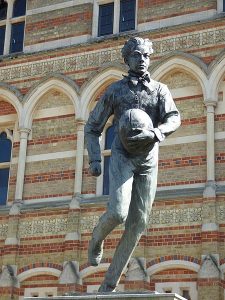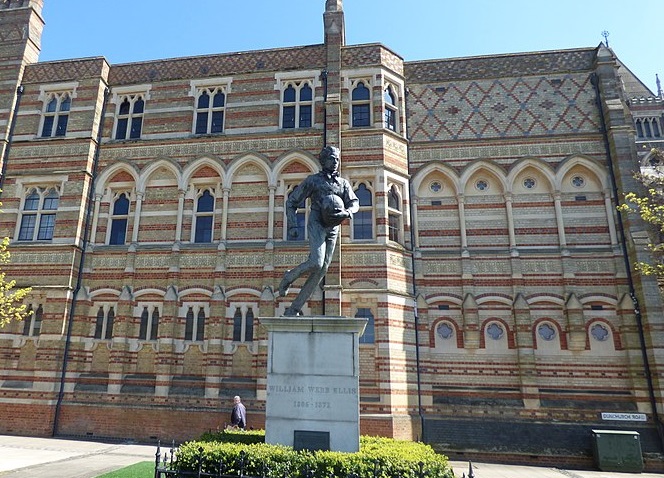In 1823, two hundred years ago at Rugby School, a Salford boy by the name of William Webb Ellis was playing a game of football when he picked up the ball, cradled it in his arms… and ran.
Well, at least that’s how the legend goes. In reality, no one can be sure of the true origins of the sport of Rugby such is its muddied relationship with early football, whilst its political entanglements are entrenched in an endless bog of mired mystery.
With the Rugby Union World Cup final waiting in the wings for this Saturday’s theatrical showdown between New Zealand and South Africa, one of these two southern hemisphere teams will be hoisting the William Webb Ellis Cup jubilantly above their heads.

One question then remains: How did it come to be that Rugby Union’s most prestigious trophy is named after a Salford-born clergyman who may not have invented the sport?
To answer that we must rewind the clock past Japan’s incredible 2015 World Cup win over South Africa, beyond Jonny Wilkinson’s World Cup-winning drop goal and past every Haka you can imagine, back to 1806, Salford.
Born November 24 1806 and the youngest of three sons, Webb Ellis moved to Rugby as a young child after the death of his second lieutenant Father, James Ellis, which led to his family receiving £30 from the sovereign in recognition of his service which his mother used to educate her sons.

In those days any pupil living within 10 miles of the Rugby Clock Tower would garner a free education as a ‘local foundationer’, so all the Webb Ellis family had to do was move into proximity.
Webb Ellis was noted as a keen sportsman playing football and cricket, which in the latter he would go on to play a first-class cricket match for Oxford University against Cambridge University in 1827.
There is only one account of Webb Ellis’ Rugby legend which comes from Matthew Bloxam, a local antiquarian and former pupil of Rugby School.
On October 10 1876, in a letter to the Rugby School magazine called The Meteor, Bloxam described the now well established Rugby Football as originating from William Webb Ellis picking up the ball and running forwards which were against the rules in those days.
He wrote:
“A boy of the name Ellis – William Webb Ellis – a town boy and a foundationer, whilst playing Bigside at football in that half-year [1823], caught the ball in his arms. This being so, according to the then rules, he ought to have retired back as far as he pleased, without parting with the ball, for the combatants on the opposite side could only advance to the spot where he had caught the ball, and were unable to rush forward till he had either punted it or had placed it for some one else to kick, for it was by means of these placed kicks that most of the goals were in those days kicked, but the moment the ball touched the ground the opposite side might rush on. Ellis, for the first time, disregarded this rule, and on catching the ball, instead of retiring backwards, rushed forwards with the ball in his hands towards the opposite goal.”
The validity of Webb Ellis’ misdemeanours has been disputed since by scholars and rugby players alike, even more so since the ball-carrying Salfordian died four years before any account of his story frothed to the surface.
Notably, Bloxam had described his story three times, each time amending the year the event occurred.
Although there remains no proven first-hand testimony of Webb Ellis’ exploits, a pupil who attended Rugby School with him at the time, Thomas Harris, said Webb Ellis had been known to take an “unfair advantage at football.”
Transcending football, it was also said that Webb Ellis was equally “rather inclined to take unfair advantage at cricket”, once again fuelling the fire that he could have been capable of committing such a deed.
It was only in 1895 that Webb Ellis was really credited with Rugby’s inception a month before the great North-South Rugby Union split which birthed Rugby Union and Rugby League.
Although Rugby was dominated at the time by northern teams, it was the middle-class southern teams that wore the trousers at the RFU and were harshly punishing the working-class teams of the north for trying to re-compensate players who missed work through playing.
This was cooking up turmoil in the RFU kitchen, leading to an eventual overspill that led to the Rugby Union and League divorce.
It would seem that the Old Rugbeian Society that investigated Webb Ellis’ story, 12 years after Bloxam’s death, were looking for a placeholder to take up the mantle and proudly proclaim Rugby Football as a sport invented and native to the more southern realms of England.
Other theories credit a Rugby School pupil, Jem Mackie with the sport’s birth in 1838-39, however murmurings of illegal ball carrying reach back as far as 1822, implying, if anything, that the students at Rugby School were in fact just terrible at playing football.

It is hard to credit the invention of a sport which in its essence is so simple, a player carries a ball, whilst everyone else tries to get it off them. Most countries have played a form of such a sport for centuries.
In Ireland there is Gaelic Football, Italy has Calcio Fiorentino, La Soule in France, Georgia plays Lelo Burti and Australia plays Marn Grook before the arrival of colonisation.
In essence, Webb Ellis is not the villain, although he certainly was not the first to pick up a ball and run. Simply put he is the placeholder chosen to represent the sport, and whilst many suggest renaming the William Webb Ellis Cup that the winning nation will lift high above their heads on Saturday, for now, for Salford, who better than one of its very own!















One Comment